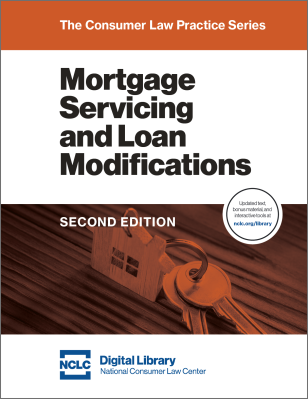Free Public Access to Chapter Covering the Very Latest Homeowner Protections
This chapter was updated on March 26, 2021.
Federal legislation and actions by the federal investors Fannie Mae, Freddie Mac, FHA, VA, and Rural Housing Service (RHS) provide new and constantly changing protections for homeowners dealing with mortgage payments during the COVID-19 pandemic. Current rights are detailed in a new digital-only chapter to NCLC’s Mortgage Servicing and Loan Modifications. For a limited time, this chapter, normally requiring a subscription, is now open to the public here. All cites in this article (unless otherwise indicated) are to NCLC’s Mortgage Servicing and Loan Modifications Chapter 12, and the public can view the cited subsections by clicking on the relevant links.
The chapter is updated with the very latest federal investor changes in policy. This includes the protections announced on February 16, 2021 by the Biden Administration, FHA’s Mortgagee Letter 2021-05, and the Fannie Mae and Freddie Mac policy updates from February 25, 2021 on forbearance and deferral. The chapter will continue to be updated as developments arise. The chapter also covers state-based actions to protect homeowners during the pandemic and provides advice for homeowner protections where mortgages are not backed by any of the five federal investors, and where CARES Act protections do not apply. In the near future, the chapter will be expanded to also cover an extensive discussion of homeowner rights during natural disasters (to be added at § 12.2).
NCLC has also updated the Summary of Foreclosure Alternatives for Borrowers with COVID-19 Hardships chart, which provides a useful and brief summary of the protections that apply for federally backed mortgages.
While this new chapter covers COVID epidemic-related foreclosure moratoria, the digital version of a companion treatise, NCLC’s Home Foreclosures, contains more detail on these moratoria and an important new § 5.13a.5, Strategies to Challenge a Foreclosure As a Violation of Pandemic-Related Protections. (Home Foreclosures requires a subscription.)
Introduction to the New Chapter
At NCLC’s Mortgage Servicing and Loan Modifications § 12.3.1, the new chapter provides pointers for how a practitioner can help a homeowner exercise new rights during the pandemic. Section 12.3.2 is an overview of the new homeowner rights, and § 12.3.3 details forbearance rights provided by the 2020 CARES Act: timing, coverage, avoidance of any application requirement, mandatory approval, length, and terms. Section 12.3.3.6 describes the CARES Act foreclosure moratorium.
The new chapter then turns to additional and more detailed current rights as set out by the five federal investors that back most American mortgages. These rights relate to foreclosure moratoria, forbearance of mortgage payments, and homeowner options coming out of a forbearance period, as specified for each of these investors:
- Fannie Mae;
- Freddie Mac;
- FHA;
- VA;
- RHS.
Information on determining which of these five investors is applicable to an individual homeowner’s mortgage loan is provided at § 12.3.1.
Chapter 12 details homeowner rights separately for each investor, which is a necessary approach as rights are different for each type of investor-backed mortgage loan. The chapter also covers homeowner advice where a mortgage loan is not backed by one of these five federal investors as well as additional state-based protections.
Fannie Mae Mortgage Loans
For Fannie Mae mortgage loans, the analysis covers these homeowner rights:
- The foreclosure moratorium now through February 28, 2021, at § 12.3.4.2.
- Mortgage forbearance, at § 12.3.4.3.1.
- Options coming out of forbearance, at § 12.3.4.3.2.
- The post-forbearance COVID-19 deferral, at §§ 12.3.4.3.3, 12.3.4.3.4.
- The post-forbearance Flex Modification in the COVID-19 context, at § 12.3.4.3.5.
Freddie Mac Mortgage Loans
For Freddie Mac mortgage loans, the analysis covers these homeowner rights:
- The foreclosure moratorium now through February 28, 2021, at § 12.3.5.1.
- Mortgage forbearance, at § 12.3.5.2.1.
- Options coming out of forbearance, at § 12.3.5.2.2.
- The post-forbearance COVID-19 deferral, at § 12.3.5.2.3.
- The post-forbearance Flex Modification in the COVID-19 context, at § 12.3.5.2.4.
Federal Housing Agency (FHA) Mortgage Loans
For Federal Housing Agency (FHA) mortgage loans, the analysis covers these homeowner rights:
- The foreclosure moratorium now through March 31, 2021, at § 12.3.6.2.
- Mortgage forbearance, at § 12.3.6.3.
- Options coming out of forbearance, at § 12.3.6.4.
- The post-forbearance COVID-19 Standalone Partial Claim, at § 12.3.6.4.2.
- The post-forbearance COVID-19 Owner-Occupant Loan Modification, at § 12.3.6.4.3.
- The post-forbearance COVID-19 Combination Partial Claim and Loan Modification, at § 12.3.6.4.4.
- The post-forbearance COVID-19 FHA-HAMP Combination Loan Modification and Partial Claim with Reduced Documentation, at § 12.3.6.4.5.
Department Veterans of Affairs (VA) Mortgage Loans
For Department of Veterans Affairs (VA) mortgage loans, the analysis covers these homeowner rights:
- The foreclosure moratorium now through March 31, 2021, at § 12.3.7.2.
- Mortgage forbearance, at § 12.3.7.3.
- Options coming out of forbearance, at § 12.3.7.4.
U.S. Department of Agriculture (USDA) Mortgage Loans, Through Its Rural Housing Service (RHS)
For U.S. Department of Agriculture (USDA) mortgage loans, through its Rural Housing Service (RHS), the analysis covers these homeowner rights:
- The foreclosure moratorium now through March 31, 2021, at § 12.3.8.2.
- Mortgage forbearance, at § 12.3.8.3.
- Options coming out of forbearance, at § 12.3.8.4.
State-Based COVID Relief
State-based mortgage relief is important for two reasons. Many mortgage loans do not fall under the five categories of federal investors described above, and in some cases state rights will apply to such loans. In addition, states may provide rights beyond those provided by the five federal investors.
Section 12.3.9 provides an overview of state rights that originate from state legislatures, governor’s offices, and state regulatory agencies. In many instances the relief has been limited to imposing moratoria on foreclosure activities. See § 12.3.9.2. However, several states have gone further and established substantive forms of relief for borrowers, including forbearance and post-forbearance options. See § 12.3.9.3.
Portfolio and Private Label Securities
CARES Act mortgage loan protections generally apply only to loans backed by the five federal investors described above. Many other mortgage loans are not covered, including loans in lender portfolios or in private label securities (PLS). Section 12.3.10 provides advice—for these other mortgage loans—on how a consumer advocate or homeowner can press for similar rights during the COVID-19 pandemic as set out by the federal investors.
Other Chapters of Mortgage Servicing and Loan Modifications
New Chapter 12 on protections during the COVID pandemic supplements the other chapters of NCLC’s Mortgage Servicing and Loan Modifications, available as a digital-only or a print+digital subscription. This treatise covers all aspects of mortgage servicing and loan modifications, including:
- Loan servicer procedures, incentives, and abuses;
- Analyzing a servicing case;
- Using RESPA discovery and dispute rights;
- RESPA, TILA, other federal rights dealing with servicers;
- State law protections and a state-by-state analysis of state mortgage servicing laws;
- Litigation with mortgage servicers, with sample pleadings;
- Loss mitigation basics;
- Fannie Mae, Freddie Mac, FHA, VA, and RHS loss mitigation programs;
- Pursuing loss mitigation rights through litigation.
Home Foreclosures as a Companion Treatise
Mortgage Servicing and Loan Modifications covers homeowner rights prior to initiation of a foreclosure. A companion treatise, NCLC’s Home Foreclosures, also available as a digital-only or print+digital subscription, picks up where Mortgage Servicing and Loan Modifications leaves off:
- Who has legal authority to foreclose and the role of MERS;
- Procedural and substantive foreclosure defenses;
- Special issues with Fannie Mae, Freddie Mac, FHA, VA, and RHS foreclosures;
- Foreclosure litigation and sample pleadings;
- Using bankruptcy to stop foreclosures;
- Rights after the foreclosure sale;
- Unique 50 state, state-by-state summaries of state judicial and non-judicial foreclosure laws, state laws on tax abatement rights and tax liens, and state laws on reverse mortgages.
Special chapters cover special types of foreclosures:
- Reverse mortgages including HECM rights;
- Tax liens and tax Sales;
- Land installment contracts;
- Manufactured homes;
- Condominiums.
Of special note, NCLC’s Home Foreclosures includes a new section 5.13a on foreclosure defense related to the COVID-19 pandemic, including § 5.13a.5, Strategies to Challenge a Foreclosure As a Violation of Pandemic-Related Protections.


